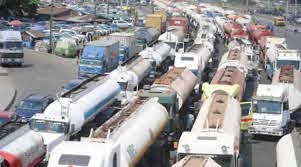The Executive Secretary, Nigerian Shippers’ Council (NSC), Mr Hassan Bello, on Friday said he was optimistic that the gridlock in Apapa, Lagos State, would disappear by the first quarter of 2021.
Bello made this known while receiving members of the National Advisory Committee set up by the President on African Continental Free Trade Area (AfCFTA).
He said the gridlock and other issues in the ports and along the corridors were being tackled, which would ensure the country utilised the benefits in the AfCFTA.
“We have a deficit on infrastructure, issues in rail, road, connectivity between our ports and the hinterland and elsewhere in Africa. I am an optimistic person and that is why I want to say that by March, first quarter of 2021, the gridlock in Apapa will disappear. This is because we are approaching it in a scientific way; first, we have to make the ports digital and contactless, no need to go to the port to make payment or other transactions, all these will be online”.
Bello said the country’s dependence on roads for delivery and evacuation of cargoes was totally wrong, hence, they were introducing rail and barges through the inland waterways.
He said the Nigerian Ports Authority (NPA) would deploy an electronic call-up system to manage traffic, customs would be on e-customs and there would be provision of scanners.
Bello said Nigeria had things to make it a natural leader; biggest economy in Africa, population, vast stretch of hinterland, coastline, market and others.
He said all these would have to come together in a very deliberate manner to facilitate trade, but infrastructure and processes were also very important.
The NSC boss said he had been advocating for the economy to be trade-based, which he believed would have an impact on the economy internally, production, manufacturing, transport and others.
On AfCFTA, he said,“Fifty-two countries have ratified this agreement that is coming up effectively in January 2021, billions of people will be involved, a lot of Gross Domestic Product depending on what one has offered to your country.
“It is like the World Cup, when five countries are scrambling for a host in the cup, going round, inspecting the stadia, infrastructure, hotels to determine the readiness or otherwise and the best will be given, this is where we are in the free trade area in Africa. This agreement is good but will only favour those who are ready, who are continuously improving on their infrastructure and if I look at the state of our readiness, then we have a lot of work to do”.
Bello said Nigeria was conscious of her natural position and must do certain things by itself.
“Having a national fleet is very important for us to operate and manage, carry our own crude oil, look at our trade terms, and there are also laws that we will harvest”.
Bello promised to appoint some shippers council staff to work with the committee to ensure the free trade agreement was done.
Mrs Funmi Folorunso, an AfCFTA champion for the transport sector, said they would ensure that Nigeria took leadership position in the African trade area, focusing on transportation.
According to her, the African trade area is a game changer that might be utilised, underutilised or poorly utilised.
“The essence of this meeting is to start off an engagement with NSC, to work with them to ensure that Nigeria optimises the potentialities, benefits, not just by sitting down but hard work. Recently we had a workshop where we looked at different groups and we have come up with an interim report on the workshop which we will present to you. However, the trade agreement is coming into effect Jan. 1, 2021 and from your presentation during the workshop, you said that nobody will hand over leadership positions to us just because of population, vast land and others. We appreciate the lot of work the council has done, even keeping the economy going during the peak of the COVID -19 pandemic, and this is why our first port of call after the workshop is here. We hope that you will direct us, going forward, on what is the next step”.

